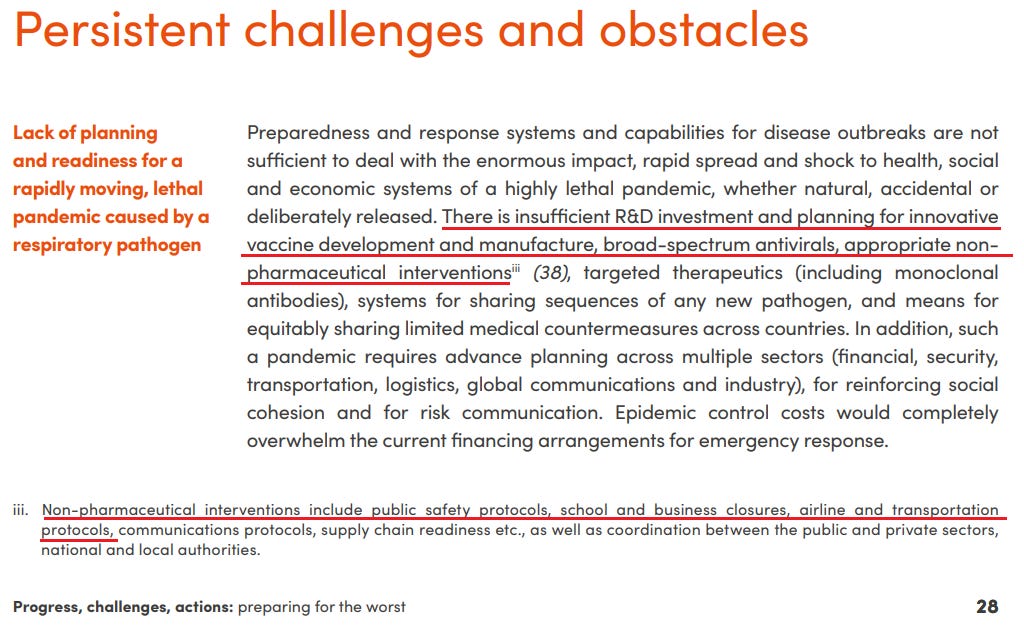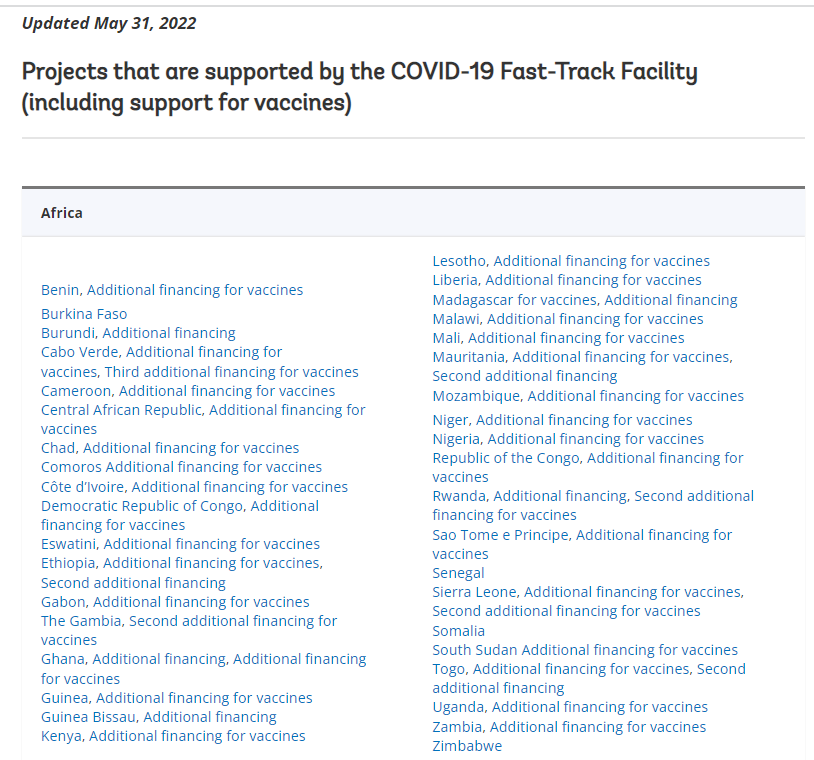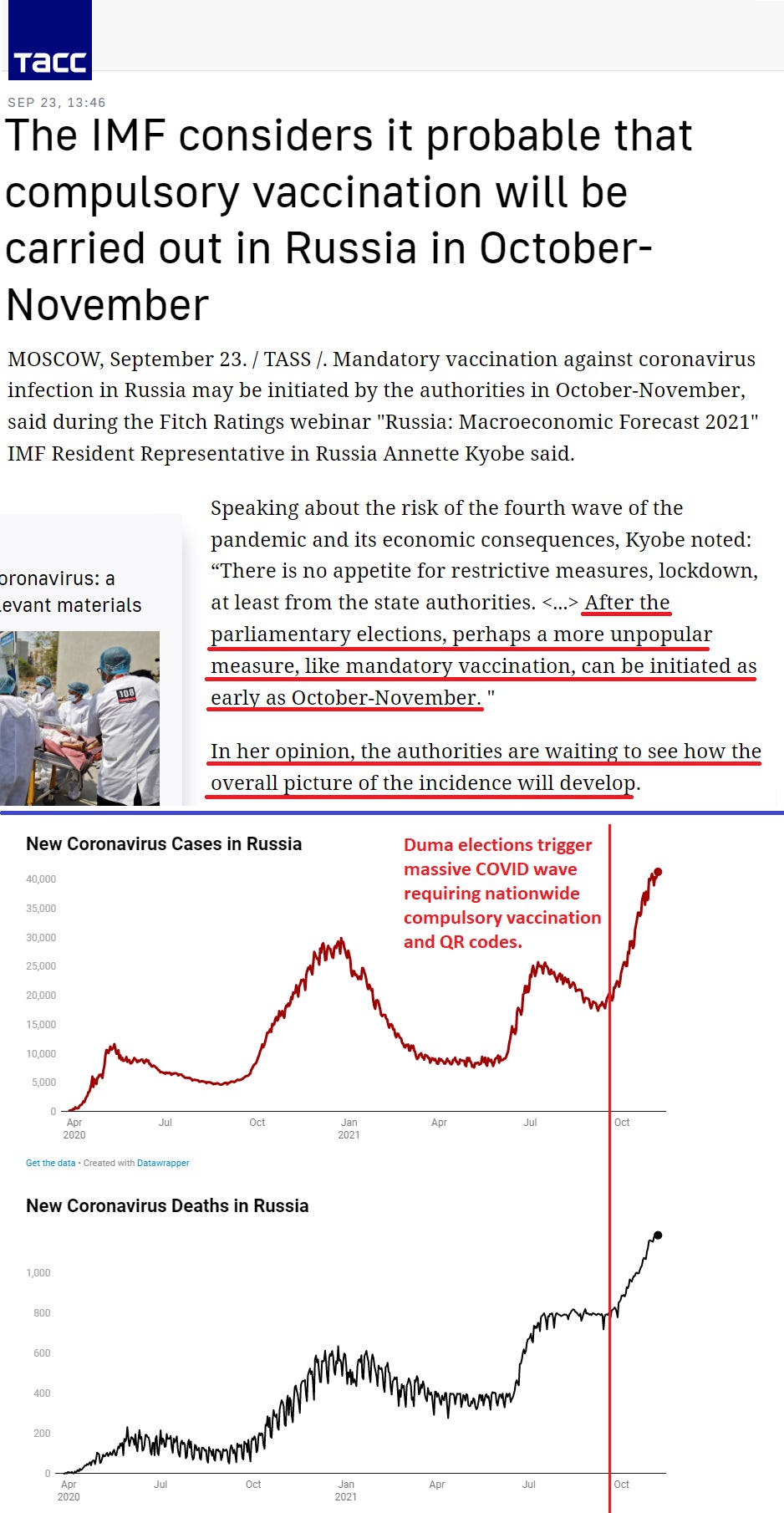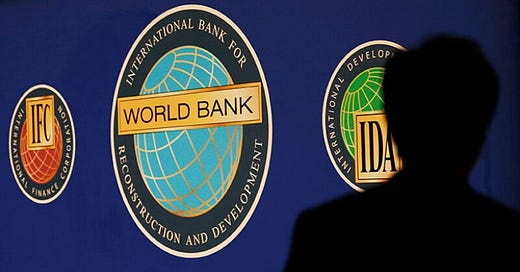Pandemic preparedness: It's what banking cartels crave!
The World Bank won't leave you alone until you're poor, vaxxed and cattle-tagged
With backing from the WHO, the Bill & Melinda Gates Foundation, and the World Bank, the Global Preparedness Monitoring Board (GPMB) launched in 2018 with a simple message: a massive pandemic is imminent and everyone will die unless we ban all non-corporate economic activity and submit to experimental injections.
But wait: isn’t the World Bank a charitable grant-giving organization dedicated to eradicating poverty and creating a brighter tomorrow? Why would such a kindhearted and homely institution co-sponsor an international committee of lecherous technocrats obsessed with unproven clot-shots and “non-pharmaceutical interventions”? (Also, why didn’t GPMB secure funding from other prestigious banking establishments, such as Herman Gref’s House of Horrors?)

The short answer is: “Because the World Bank hates you and has been on a global crusade for economic exploitation since emerging from the bowels of Bretton Woods in 1944.”
But the long answer is much more nebulous and soul-crushing, and so that is what we will focus on in this blog post.
Clot-shots: Genesis
Our story begins in 2015 in Ebola-besieged West Africa.
GAVI—the Bill Gates-funded vax emporium—had already earmarked $300 million for mass vaccination once a “safe and effective” Ebola shot was approved by the WHO. The World Bank followed by pledging more than $1.6 billion in definitely-no-strings-attached financing for the hardest-hit nations.
The race was on. Who would be the first to inject the West Africans?
Declaring Ebola the “common enemy,” Beijing deployed 200 medical workers and advisers to Sierra Leone, Liberia, and Guinea. In October 2015, China’s CanSino Biologics began testing an adenovirus type 5 vector–based Ebola vaccine in Sierra Leone.

At the same time—almost on the exact same day—American pharmaceutical Johnson & Johnson launched its own clinical trials in Sierra Leone in order to test the safety and efficacy of its adenovirus type 26 vector–based Ebola vaccine.
Meanwhile, Russia’s Gamaleya Center (which later became world-famous for its trailblazing genetic COVID shot, Ad26 + Ad5, aka “Sputnik V”) pushed out its own adenovirus type 5 vector–based Ebola vaccine.
Unlike its vax rivals, Russia wasn’t in any hurry to test its experimental shot in West Africa. Instead, Moscow simply declared victory.
In February 2016, Russian health minister Veronika Skvortsova—who later became a founding member of the Global Preparedness Monitoring Board—boldly claimed Gamaleya’s genetic injection was the only proven Ebola vaccine.
A year later, Gamaleya scientists finally arrived in Guinea to begin small-scale tests of their vaccine. By then the “common enemy” had already been defeated: Guinea was declared Ebola-free in June 2016. (Russia failed to even apply for international recognition of its Ebola shot; unsurprisingly, “the only proven Ebola vaccine” was missing in action when Ebola resurfaced in Guinea in 2021. A very fitting overture to Sputnik V, which is a proven scam.)

The WHO eventually gave its blessings to two Ebola shots: Johnson & Johnson’s genetic slurry and some random goo developed by Merck. Both scams, obviously.
As the Financial Times reported in May 2018, the World Bank learned an important lesson from this episode: no expense can be spared when pumping out life-saving experimental injections.
Jim Yong Kim, the World Bank president, said the facility “shows that we have learned some of the stark lessons of the deadly 2014 Ebola outbreak and are well on our way to stopping the cycle of panic and neglect”.
“It is a critical part of our effort to ensure that money does not hold back effective pandemic response,” he said.
Another innovation in the response to this Ebola outbreak is the use of an experimental vaccine, supplied by Merck, the US drug manufacturer. Some 7,500 doses have been sent to DRC and health workers began to administer them on Tuesday.
But the West Africa Ebola Crisis gave us more than just the world’s first genetic vaccine contest. The World Bank responded to the outbreak by creating the Pandemic Emergency Financing Facility (which provided biothreat-related financing and was retired in April 2021) and also (drumroll): the Global Preparedness Monitoring Board.
A Bill Gates-funded crystal ball
GPMB’s inaugural meeting was held in September 2018. Apart from Russia’s clot-shot guru Veronika Skvortsova, the committee would serve as a clubhouse for the world’s most beloved health professionals, including Dr. Chris Elias, President of the Bill & Melinda Gates’ Global Development Program, and American sad-sack Anthony Fauci.

The newly formed committee was hailed by the liveliest intellects of our time.
In March 2019, the World Economic Forum published an article with the provocative clickbait headline: “The global economy is woefully unprepared for biological threats. This is what we need to do.”
The solution is insanely simple, according to the WEF. All we need to do is do whatever the WHO and the World Bank tell us to do. Probably this will involve getting injected with an “experimental vaccine”:
While the world remains badly under-prepared for even modest biological threats, the WHO and others are taking meaningful steps to improve capacity to mitigate risk and impact of outbreaks. Recent years have seen the establishment of a Global Preparedness Monitoring Board, WHO’s Contingency Fund for Emergencies, the World Bank’s Pandemic Emergency Financing Facility and the creation of the Coalition for Epidemic Preparedness Innovations. Also, for the first time, an experimental Ebola vaccine [!!!!!!!!!!!!!!!! — Edward] is being used to contain spread of the disease in DRC, saving countless lives.
Game. Set. Clot-shot.
Most experts agree that GPMB’s crowning achievement is its 2019 Annual Report, “A World At Risk.”
Among other morsels of sage advice, the document advocated for school and business closures and rapid vaccine development during times of declared health crisis.

It was basically a blueprint for COVID Tyranny. Russia’s Kommersant newspaper, writing in December 2020, marveled at the report’s crystalline foresight:
In September 2019, [GPMB] published a report entitled “The World at Risk”, in which it concluded that the likelihood of a global pandemic of a respiratory disease with a high lethality is growing and humanity is not ready for it. […]
The Council urged governments to begin preparations for such an event as soon as possible in order to reduce the likely damage both to the health and lives of citizens, and to economies and health systems.
Predicting a massive “pandemic” that could only be solved by murdering the global economy and injecting the plebes—and it all came true in less than a year, somehow.
Clot-shot loans
Like a weird pandemic predictions relay race, the World Bank took the baton from GPMB upon the arrival of COVID.
On April 2, 2020, the World Bank unveiled its COVID-19 Strategic Preparedness and Response Program, which aimed to provide financial support for client countries as they battled the onslaught of positive PCR tests.
Apparently aware that lockdowns and other economy-crippling policies would be with us for a long time, the World Bank planned for five years of COVID-related financial programs. Yes, according to the World Bank, virus-related economic intervention will be necessary until March 31, 2025.

What kind of “financing” is involved here, though? We copy-pasted some interesting facts from the World Bank’s website:
On May 19, 2020 the World Bank announced its emergency operations to fight COVID-19 have reached 100 developing countries – home to 70% of the world’s population. On October 13, 2020, $12 billion was approved for developing countries to finance the purchase and distribution of COVID-19 vaccines, tests, and treatments for their citizens. On June 30, 2021 President Malpass announced the expansion of financing available for COVID-19 vaccine financing to $20 billion over the next 18 months, adding $8 billion to the previously announced $12 billion.
Clot-shot loans. Clot-shot loans everywhere. And not just in Africa and Asia. Also Moldova.

So basically: the World Bank is planning to shill COVID clot-shots to poor people until at least 2025.
But does the WHO anticipate another three years of cycling through the Greek alphabet, or maybe combining multiple letters to create pretentious sorority-mutations? Judging from “The Strategic Preparedness, Readiness and Response Plan to End the Global COVID-19 Emergency in 2022,” published at the end of March, it looks like Dr. Tedros is hedging his bets:
Although it is not possible to eliminate SARS-CoV-2, by addressing the drivers of transmission and disease impact in every country we can end the global COVID-19 emergency in 2022. […]
Another potential scenario to be kept in mind is the emergence of an essentially new SARS-CoV-2 virus. This could be through a new emergence from a pre-existing or newly established animal reservoir, or due to a recombination event in which a patient co-infected with two separate variants of SARS-CoV-2 produces new infectious viral particles that have genetic characteristics shared with both parent lineages.
This scenario would effectively be a reset, with a completely susceptible global population.
Scenario #1: COVID can never be fully eradicated, but maybe, possibly, and with enough revaccination, the dreaded virus will no longer qualify as a global health emergency. But again, no guarantees.
Scenario #2: maybe a scary virus originating from a monkey—just as an example—will ravage the earth, triggering a “vaccine reset” and forcing everyone to get injected with a new smorgasbord of genetic goo.
These are the only two possibilities, apparently.

Anyway. There’s a lot more to type about but we’ll have to save the rest for another day. Maybe next time we’ll write about another visionary clot-shot cartel, the IMF.






"Sorority Mutations"!
Enter that in the lexicon! I have a feeling it's gonna come in handy!
It so wonderfully evokes a beyond-awesome 1990s splattercore film series that never was, but damn sure shoulda been.
this episode made a strong impression on me. it began with cansinobio,
which got me looking for the link between that entity and canada.
https://www.canada.ca/en/national-research-council/news/2020/05/the-national-research-council-of-canada-and-cansino-biologics-inc-announce-collaboration-to-advance-vaccine-against-covid-19.html
well done on this one RILEY!